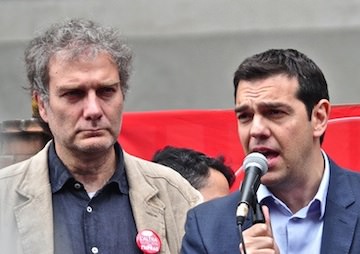Greece’s Ascendant Syriza Party: Blatant Anti-Capitalists or Mere Social Democrats?
A member of the Greek left's "best chance at success in a generation" clarifies the party's view on whether the country's political economy should be reformed or completely overhauled. Alexis Tsipras (center), leader of Greece's Syriza party. Photo by Dani_iele (CC BY-ND 2.0)
Alexis Tsipras (center), leader of Greece's Syriza party. Photo by Dani_iele (CC BY-ND 2.0)
In an interview published at Jacobin three days ahead of legislative elections (held today, Jan. 25) that the Syriza party is expected to dominate, a member of the Greek left’s “best chance at success in a generation” clarified the party’s view on whether the country’s political economy should be reformed or completely overhauled.
“[H]ow would you characterize Syriza’s line?” Sebastian Budgen, an editor for Verso Books, asked of Stathis Kouvelakis, a member of Syriza’s central committee and a political theory professor at King’s College London. “Would you also say that this coalition is following an anticapitalist line, or is its activity part of a more gradual, reformist approach?”:
In terms of its programmatic and ideological identity, Syriza has a strong anticapitalist line, and it has very sharply set itself apart from social democracy. That consideration is all the more important if we think about the history of the battles within Synaspismos that pitched tendencies who were favorable to allying with social democrats against other currents who were hostile to any sort of agreement or coalition, including at the local level or in trade union activity.
The “social democratic” wing of Synaspismos definitely lost control of the party in 2006 when Alekos Alavanos was elected its president. This right wing, led by Fotis Kouvelis, almost exclusively originating in the Eurocommunist right group coming from EAR, ultimately left Synaspismos and set up another party called Democratic Left (Dimar): a formation that claims to be a sort of halfway house between Pasok and the radical left.
So Syriza is an anticapitalist coalition that addresses the question of power by emphasizing the dialectic of electoral alliances and success at the ballot box with struggle and mobilizations from below. That is, Syriza and Synaspismos see themselves as class-struggle parties, as formations that represent specific class interests.
What Syriza wants to do, Kouvelakis says, “is advance a fundamental antagonism against the current system. That’s why it’s called ‘Syriza’: meaning, ‘coalition of the radical left.’ And this assertion of radicalism is an extremely important part of the party’s identity.”
Read more of the interview here.
— Posted by Alexander Reed Kelly.
Your support matters…Independent journalism is under threat and overshadowed by heavily funded mainstream media.
You can help level the playing field. Become a member.
Your tax-deductible contribution keeps us digging beneath the headlines to give you thought-provoking, investigative reporting and analysis that unearths what's really happening- without compromise.
Give today to support our courageous, independent journalists.






You need to be a supporter to comment.
There are currently no responses to this article.
Be the first to respond.